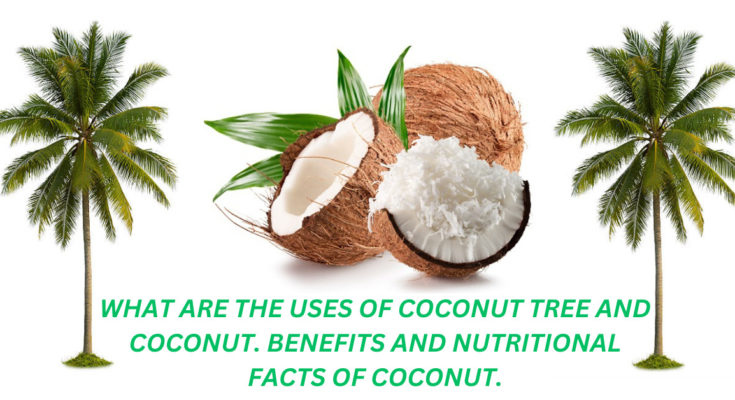Coconut is a tropical fruit that grows on the coconut palm tree. It is a very versatile fruit that is used in a variety of ways, from culinary uses to medicinal and cosmetic applications.
The coconut has a hard, fibrous outer shell, a layer of white meat, and a liquid known as coconut water, which is contained inside the shell. The meat can be used in a variety of ways, including grated and dried for use in baking and cooking, as a garnish or topping for desserts, or as a base for making coconut milk. Coconut water is a popular drink in tropical regions, and is known for its hydrating properties.
Coconut oil, which is extracted from the meat of the coconut, has gained popularity in recent years for its health benefits and versatility in cooking and beauty applications. It is rich in medium-chain fatty acids, which are believed to provide a range of health benefits.
Coconut is also used in traditional medicine practices for its various health benefits, including its anti-inflammatory and antimicrobial properties. Additionally, coconut has been used in cosmetics for its moisturizing and nourishing properties.
The coconut tree, also known as the “Tree of Life,” has a wide range of uses that have been utilized by humans for thousands of years. Here are some of the most common uses of coconut and the coconut tree:
1. Food: Coconuts are a staple food in many tropical regions and can be consumed in various forms such as coconut water, coconut milk, coconut oil, and shredded coconut. Coconut flesh is also used in cooking and baking, as well as in various desserts.
2. Fiber: The husk of the coconut is used to make various products such as ropes, mats, and brushes. Coconut fiber is also used as a natural filling material in mattresses and cushions.
3. Medicine: Various parts of the coconut tree have medicinal properties. Coconut oil is used for its anti-inflammatory and anti-bacterial properties. The water and flesh of the coconut are also used to treat various ailments such as dehydration, constipation, and skin conditions.
4. Building materials: The trunk of the coconut tree is used to make various building materials such as timber, roofing, and fencing. The leaves of the coconut tree are also used to make thatch for roofing.
5. Fuel: Coconut shells and husks are used as fuel for cooking and heating. Coconut oil is also used as a biofuel.
6. Ornamental: The coconut tree is a popular ornamental plant due to its tropical appearance and ability to grow in sandy soil. The leaves of the coconut tree are also used for decorative purposes in flower arrangements.
Overall, the coconut tree and its products have a wide range of uses that make it an important resource for many communities around the world.
COCONUT HEALTH BENEFITS.
Coconuts are a versatile fruit that have been used for centuries in traditional medicine to treat a variety of health conditions. Here are some potential health benefits of coconuts:
1. Rich in nutrients: Coconuts are a rich source of nutrients, including fiber, vitamins C, E, B1, B3, and B6, and minerals such as iron, calcium, magnesium, and potassium.
2. Heart health: The healthy fats in coconuts, particularly medium-chain triglycerides (MCTs), may help to reduce cholesterol levels, lower blood pressure, and decrease the risk of heart disease.
3. Boosts immune system: Coconuts contain lauric acid, a fatty acid that has antimicrobial properties and may help to boost the immune system by fighting off harmful bacteria, viruses, and fungi.
4. Skin health: Coconut oil has moisturizing and anti-inflammatory properties that may help to improve skin health by reducing inflammation, soothing irritated skin, and preventing acne.
5. Promotes weight loss: The MCTs in coconuts may help to increase energy expenditure and promote weight loss by reducing appetite and increasing fat burning.
6. Digestive health: The fiber in coconuts may help to promote healthy digestion by regulating bowel movements and preventing constipation.
7. Brain function: The MCTs in coconuts may also help to improve cognitive function and memory by providing a quick source of energy for the brain.
Overall, coconuts offer a wide range of potential health benefits and are a delicious and versatile addition to a healthy diet.
HOW TO USE COCONUT AND COCONUT TREE PRODUCTS.
There are numerous ways to use coconut and coconut tree products. Here are some examples:
1. Coconut oil: Coconut oil is a versatile oil that can be used for cooking, baking, and skincare. It can be used as a substitute for butter or vegetable oil in recipes, as a moisturizer for skin and hair, and as a natural makeup remover.
2. Coconut water: Coconut water is a refreshing and hydrating drink that can be consumed on its own or used as a base for smoothies and cocktails.
3. Coconut milk: Coconut milk is a creamy and flavorful ingredient that can be used in curries, soups, and desserts. It is a great alternative to dairy milk for those who are lactose intolerant or vegan.
4. Coconut flour: Coconut flour is a gluten-free and low-carb flour that can be used in baking. It adds a rich, nutty flavor to baked goods and can be used as a substitute for wheat flour.
5. Coconut sugar: Coconut sugar is a natural sweetener that is derived from the sap of the coconut palm. It has a lower glycemic index than regular sugar and can be used as a substitute in recipes.
6. Coconut shell charcoal: Coconut shell charcoal is a natural and eco-friendly alternative to traditional charcoal. It can be used for grilling, as a water purifier, and as a soil amendment for gardening.
7. Coconut husk fiber: Coconut husk fiber can be used as a sustainable alternative to traditional materials such as cotton or synthetic fibers. It is used to make products such as ropes, mats, and brushes.
Overall, coconut and coconut tree products offer a wide range of uses and benefits, making them a valuable resource in many industries.
COCONUT NUTRITIONAL VALUE.
Coconuts are a nutritious fruit with many health benefits. Here are some of the nutritional values of coconut:
- Calories: 1 cup of shredded coconut (80g) contains about 283 calories.
- Carbohydrates: One cup of shredded coconut contains 12g of carbohydrates, of which 7g are fiber and 3g are sugar.
- Protein: One cup of shredded coconut contains about 3g of protein.
- Fats: Coconut is high in healthy saturated fats. One cup of shredded coconut contains 27g of fat, of which 24g are saturated fats.
- Vitamins and minerals: Coconuts are rich in several vitamins and minerals, including manganese, copper, selenium, iron, potassium, and phosphorus.
- Antioxidants: Coconuts contain antioxidants, such as phenolic compounds, which have anti-inflammatory and anti-cancer properties.
- Medium-chain triglycerides (MCTs): Coconut oil is a rich source of MCTs, which are easily absorbed and converted into energy in the body.
However, due to its high calorie and fat content, coconut should be consumed in moderation as part of a balanced diet.
Nutritional break down
Here is a breakdown of the nutritional content of 100 grams of raw coconut meat:
- Calories: 354
- Protein: 3.3 grams
- Fat: 33.5 grams
- Carbohydrates: 15.2 grams
- Fiber: 9 grams
- Sugar: 6.2 grams
In addition, coconut meat contains various vitamins and minerals, including:
- Vitamin C: 3.3 mg
- Thiamin (vitamin B1): 0.1 mg
- Riboflavin (vitamin B2): 0.02 mg
- Niacin (vitamin B3): 0.5 mg
- Pantothenic acid (vitamin B5): 0.3 mg
- Vitamin B6: 0.05 mg
- Folate (vitamin B9): 26 mcg
- Iron: 2.4 mg
- Magnesium: 32 mg
- Phosphorus: 113 mg
- Potassium: 356 mg
- Zinc: 1.1 mg
It’s worth noting that the nutritional content of coconut may vary depending on the form in which it is consumed (e.g. raw, dried, or as coconut milk), as well as the specific variety of coconut. Nonetheless, coconut is generally a good source of healthy fats, fiber, and various nutrients.



